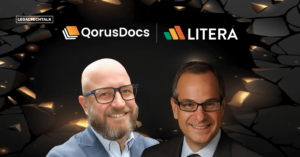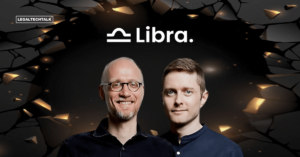In this conversation Ana Buitrago, former General Counsel at Amazon, shares her experiences during the early pandemic days, challenges and lessons learned in making quick decisions that impacted customers, employees, and partners.
The conversation moves on to Amazon’s approach to “delawyering,” explaining how legal resources are used intentionally. Ana highlights how she became a strategic partner by combining credibility, good judgment, and close collaboration with business teams.
Bradley Collins: Hi Ana, it’s an honour to speak with you. To open this interview, I’m going to be a little controversial and ask, as a veteran of the industry what’s the biggest war story you have had (or are willing to share) in your various General Counsel roles, and what were your biggest learnings from the experience?
Ana Buitrago: Definitely, I would pick up the early days of the Pandemic. In March 2020, I was Legal Director at Amazon, and two of the geographies I was in charge of – Spain and Italy – were among the first countries in the globe (together with China) that decided to proceed with a full lockdown.
This was a totally unprecedented situation, in which we had to make decisions impacting our customers, employees, and commercial partners very fast, adapt to new scenarios on the go, and act with limited, incomplete information. Moreover, any decision we took would be heavily scrutinized by our stakeholders and set a precedent for other geographies. Amazon headquarters in the USA and remaining European countries (UK, Germany, France) were looking at us to check and learn from what we were doing.
I still remember a conference call the first weekend after the lockdown at which Legal and Business leads had to decide what product categories we would continue offering in the Spanish and Italian websites and which ones we would suspend during the lockdown. The decision was driven by foreseeable logistics constraints due to social distancing rules as well as regulatory limitations of retail activities during the Pandemic. This exercise required flexibility, creativity, and customer focus, on top of a great ability to reach internal consensus among Legal and business teams in hours. I still remember the interesting discussions we held about whether we should keep offering toys, books, and sporting home equipment, just to cite a few product categories.
Bradley Collins: Now I’d like to dive a little into your experience at Amazon, what does innovation mean as a GC in a company like Amazon, and how did you as a GC, become a partner to the wider business?
Ana Buitrago: At Amazon Legal, we coined the term “delawyering” to define the purpose beyond the innovative solutions we put in place over the years. De-lawyering means continually challenging ourselves about what we can stop doing entirely or at least simplify brutally. Legal resources are scarce and we Legal leads must be very intentional as to the investment of our time. Otherwise, if we keep distracted in doing our daily, rutinary tasks, there is a high risk of losing track of those matters that require full Legal attention.
This entails a specific, unique mental model that focuses on identifying medium-low risk tasks in respect of which the company can afford empowering internal business to make informed decisions autonomously. The company must also have a healthy degree of tolerance to taking controlled, informed risks. In turn, Legal must provide internal business with self-management tools, processes, and training. Furthermore, it is key that Legal remains available for questions and feedback, and audit and iterate the mechanisms put in place. At Amazon, we had very successful outcomes in areas such as contract negotiation & lifecycle management, and marketing, for instance, saving thousands of Legal annual hours.
To answer your question regarding how did I became a partner to the wider business, I would recommend to use two main levers::
- Credibility and judgment. The in-house lawyer must display sound and right judgment, have the backbone to pushback and challenge wrong or high-risk decisions and, very important, offer practical solutions to complex issues. These solutions must be legally compliant, ethically perfect, consistent with the company’s corporate culture and, of course, operationally feasible and in line with business objectives.
- Integration with the business. In-house lawyers cannot do their job if they do not understand the objectives and main obstacles faced by the business lines they support. In my view, this is only possible if they are in close continuous contact with the business. There are many formulas to enable this integration, one of them being to organize the Legal in-house function around business units. Although this organizational structure may generate certain inefficiencies, these are offset by the benefits. For instance, a businessdriven Legal organization fosters greater transparency and open communication between Legal and the business. It also increases the common perception that all the employees, not only corporate functions, are accountable for the values that make up the corporate culture.
Bradley Collins: Finally – how is the ‘General Counsel’ role evolving right now – what are the upcoming challenges you expect what advice would you like to offer your peers during this era of evolution?
Ana Buitrago: Needless to say, we are facing uncertain, unprecedented times. Geopolitical and economic challenges are immense and nowadays we all are forced to make decisions without the information and reflection time we used to have until recently. In addition, generative AI is challenging the way we teach at Law Schools and the way we lawyers do our job, and it is hard to predict and measure its impact in the legal profession.
More than ever, we need to devote sufficient time to stay up to date on all the tech and scientific novelties around us so that we are able to identify new risks and opportunities. This combined with existing identified risks – such as cybersecurity and climate change (just to mention two) – makes being a Century XXI lawyer really interesting!
The solution cannot just be adding extra resources. These are limited and costly, without mentioning the challenges of recruiting and retaining teams we have been experimenting since the Pandemic. The challenge is to prioritise correctly and focus on those threats that we can only become aware of if we intentionally stay ahead (“dogs not burking”). In-house Legal executives must take the lead and ensure they and their teams really focus on what is important for the long term. Innovation and technology are great allies for this purpose.
Read all 13 interviews with legal experts in our latest LegalTech Diaries Volume 3: https://www.legaltech-talk.com/legaltechdiaries/volume-3/








